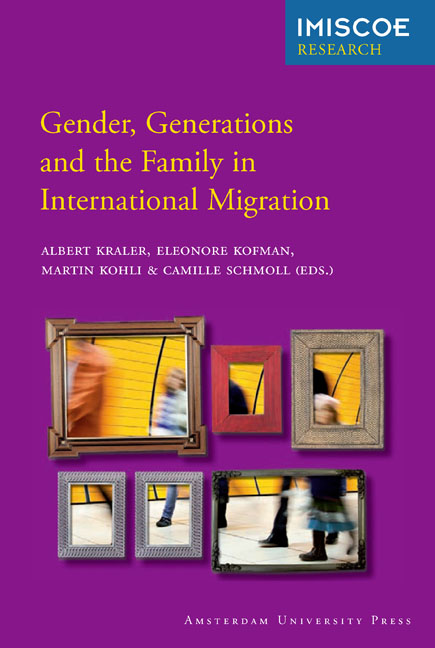Book contents
- Frontmatter
- Contents
- Preface
- 1 Introduction: Issues and Debates on Family-Related Migration and the Migrant Family: A European Perspective
- Section I The Family as a Moral and Social Order
- Section II Gender, Generation and Work in the Migrant Family
- Section III Marriage Migration and Gender Relations
- Section IV Transnational Family Lives and Practices
- List of Contributors
- Index
- Other IMISCOE titles
14 - Gender and Intergenerational Issues in the Circulation of Highly Skilled Migrants: The Case of Indian IT Professionals
Published online by Cambridge University Press: 21 January 2021
- Frontmatter
- Contents
- Preface
- 1 Introduction: Issues and Debates on Family-Related Migration and the Migrant Family: A European Perspective
- Section I The Family as a Moral and Social Order
- Section II Gender, Generation and Work in the Migrant Family
- Section III Marriage Migration and Gender Relations
- Section IV Transnational Family Lives and Practices
- List of Contributors
- Index
- Other IMISCOE titles
Summary
Introduction
Studies of highly skilled migration have been broadly imbued with the illusion of a ‘smooth circulation of skills’, focusing on the legal, economic and political mechanisms (Lowell & Findlay 2003; Martin 2003; Shachar 2006). As a consequence, such studies have been dominated by macrolevel methodology that is mostly gender-neutral or male-focused and has largely ignored the implications for families and conjugal relations (Raghuram 2004b). Although highly skilled migration deserves casespecific attention on some levels (Iredale & Appleyard 2001), it is worth investigating the personal dimensions of the migration decision-making process as one would for any other migrant (Kofman & Raghuram 2006). Issues related to gender, family or generational impacts may account for the complex movements of this kind of migrants, as much as economic and sector situations do. In this chapter, I intend to illustrate the importance of such considerations to analyse the circulation and migratory patterns of highly skilled migrants, through the example of return migration.
The return migration of skilled migrants has attracted interest in the field of migration studies, thus balancing the prevailing discourse on circulation (King 2001). It has mostly been described so far in economic terms, with reference to phenomena that have taken place in developing Asian economies, such as Taiwan and South Korea (Saxenian 2006; Kapur 2005). A few recent works have developed more qualitative approaches, drawing attention to the central role occupied by family issues in the decision-making process and in narratives of returning to the country of origin (Ley & Kobayashi 2005; Razum et al. 2005). As Evergeti and Ryan (this volume) put it: ‘there is much to be learned by combining the study of migration with family studies’. Taking into account the family dimension unravels the complexity of migration itineraries at the individual and family level, beyond the far too simple explanatory pattern of ‘skills circulation’. My goal here is to support inclusion of the topic of transnational family practices in studies of highly skilled migration.
My case study proposes an analysis of the return migration of highly skilled Indian migrants to India from this perspective. The ‘Indian soft¬ware engineer’ has come to epitomise the globally commodified circulation of skills, as an icon of the knowledge society and Castells’ society of flows (Van der Veer 2005; Chakravartty 2005).
- Type
- Chapter
- Information
- Gender, Generations and the Family in International Migration , pp. 335 - 354Publisher: Amsterdam University PressPrint publication year: 2012



